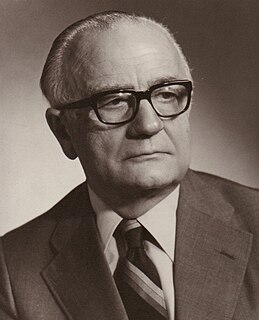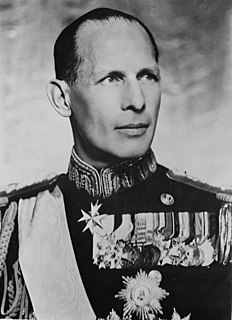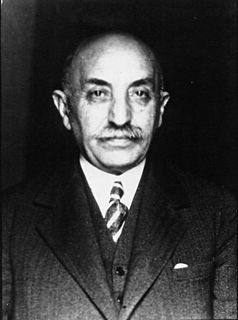
Alexandros Zaimis was a Greek Prime Minister, Minister of the Interior, Minister of Justice, and High Commissioner of Crete. He served as Prime Minister six times, and although a leader of the monarchist faction was the third and last President of the Second Hellenic Republic.

Bulgaria elects on national level a head of state - the president - and a legislature. The president is elected for a five-year term directly by the people. The National Assembly has 240 members, elected for a four-year term by proportional representation in multi-seat constituencies with a 4% threshold. Bulgaria has a multi-party system, in which no one party often has a chance of gaining power alone, and parties must work with each to form governments.

Parliamentary elections were held in Greece on 17 November 1974. They were the first after the end of the Greek military junta of 1967–1974 and took place during the metapolitefsi era. The winner was Konstantinos Karamanlis and his newly formed conservative party, ND. Karamanlis had already formed a government of national unity just after the fall of the dictatorship. The second biggest party was the centrist Center Union - New Forces. Third power in the Parliament became the newly formed PASOK, a radical socialist party led by Andreas Papandreou, son of the former prime minister Georgios Papandreou.

Parliamentary elections were held in Greece on 1 November 1920. They were possibly the most crucial elections in the modern history of Greece, influencing not only the few years afterwards, including the country's defeat by Kemal Atatürk's reformed Turkish army in 1922, but setting the stage for Greece's political landscape for most of the rest of the 20th century. It had been nearly five years since the last election, a period during which all democratic procedures were suspended due to the National Schism, when Prime Minister Eleftherios Venizelos announced that the elections would take place on 25 October. However, after the unexpected death of King Alexander, who had assumed the throne after the exile of his father, King Constantine I, the elections were postponed until 1 November.

A referendum on maintaining the monarchy was held in Greece on 1 September 1946. The proposal was approved by 68.4% of voters with a turnout of 88.6%.
A referendum on becoming a republic was held in Greece on 13 April 1924. It followed the catastrophic outcome of the Asia Minor Campaign. As a result of the military defeat, King Constantine I was forced to abdicate in favor of his son, King George II. King George himself later went into exile in Romania, the home of his wife, while the government debated the fate of the monarchy. Ultimately, a plebiscite was called. This referendum, following the restoration of Constantine I in 1920, reflected the see-saw nature of the Greek electorate and the then-present dominance of the Liberal and Republican Venizelists in Greek politics and abolished the Crown. Prime Minister Alexandros Papanastasiou favoured the vote for the Republic, while Venizelos kept a neutral stance.

The Greek royal family is a branch of the House of Glücksburg that reigned in Greece from 1863 to 1924 and again from 1935 to 1973. Its first monarch was George I, the second son of King Christian IX of Denmark. He and his successors styled themselves "Kings of the Hellenes".

The history of the Hellenic Republic constitutes three discrete republican periods in the modern history of Greece: from 1822 until 1832; from 1924 until 1935; and from 1974 through to the present. See also the constitutional history of Greece.

Parliamentary elections were held in Greece on 16 December 1923. The result was a victory for the Liberal Party, which won 250 of the 398 seats.

A referendum on retaining the republic was held in Greece on 8 December 1974. After the collapse of the military junta that ruled the country from 1967, the issue of the form of government remained unsolved. The Junta had already staged a plebiscite held on 29 July 1973, which resulted in the establishment of the Republic. However, after the fall of the military regime, the new government, under Constantine Karamanlis, decided to hold another one, as Junta legal acts were considered illegal. Constantine II, the former King, was banned by the new government from returning to Greece to campaign in the referendum, but the Karamanlis government allowed him to make a televised address to the nation. The proposal was approved by 69.2% of voters with a turnout of 75.6%.

General elections were held in Belgium on 4 June 1950. The result was a victory for the Christian Social Party, which won 108 of the 212 seats in the Chamber of Representatives and 54 of the 106 seats in the Senate. Voter turnout was 92.6%. This election was the last one in Belgian history were a single party achieved an absolute majority. Elections for the nine provincial councils were also held.

A constitutional referendum was held in Greece on 29 July 1973. The amendments would abolish the monarchy and establish a republic. The proposal was approved by 78.6% of voters with a turnout of 75.0%. This initiated the first period of the Metapolitefsi.
A constitutional referendum was held in Greece on 15 November 1968. Voters were asked whether they wished to ratify a new constitution prepared by the dictatorial regime. It was approved by 92.1% of voters, with a voter turnout of 77.7%.
A double referendum took place in Luxembourg on 28 September 1919. Voters were asked questions on their preferred head of state and whether there should be an economic union with either France or Belgium. The majority voted to retain Grand Duchess Charlotte as head of state, and for economic union with France.
A referendum on restoring the monarchy was held in Albania on 29 June 1997 alongside parliamentary elections. Officially the proposal was rejected by 66.7% of voters, although Crown Prince Leka claimed that 65.7% voted in favour.



















